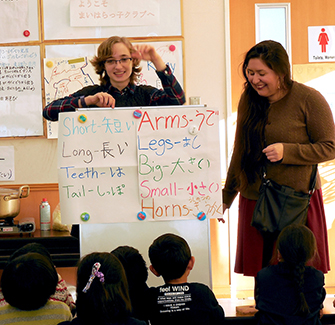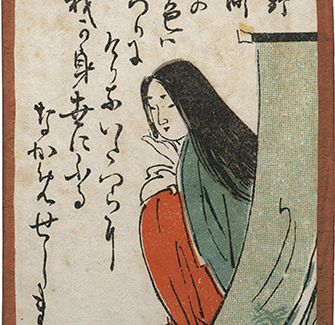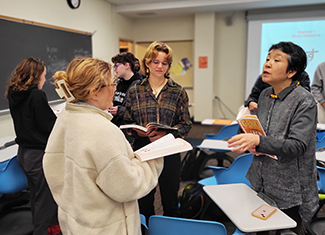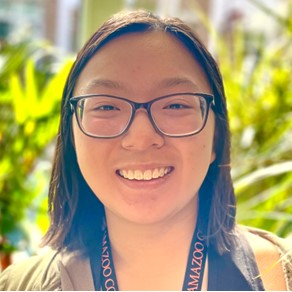
Why Study Japanese at K?
Studying Japanese at K is an enriching experience thanks to immersive study abroad opportunities, small class sizes and engaging courses.
Housed within the East Asian Studies Department, the Japanese program teaches you about Japan’s rich history, culture and language. By the time you graduate, you will have been exposed to historical and modern Japanese literature and culture and understand the social and political influences that shaped them.
You will learn about Japan through language classes—from beginner to advanced—and cultural and linguistic courses taught in English, such as Post-War Japanese Literature in Translation, Japanese Language in Society, and Manga/Anime and Gender in Modern Japan.
For complete immersion into Japanese language and culture, you can take advantage of K’s stellar study abroad programs with opportunities to live, for one to three terms, in Hikone, Nagasaki, Kyoto or Tokyo, Japan.
The robust education required for a minor in Japanese prepares students for careers in international relations, education and business. In fact, many of our alumni teach English in Japan or work for Japanese companies.
Note: Students can only Minor in Japanese; if they choose to continue their studies, they can major in East Asian Studies. However, due to the significant overlap in their programs, a student cannot major in East Asian Studies and minor in Japanese or Chinese.
What can you do with a Japanese minor?
Below are some of the careers, employers, and graduate schools of our Japanese alumni.
Careers
- English Teacher
- Digital Marketing Specialist
- Software Engineer
Employers
- Japan Exchange and Teaching (JET) Programme
- United Nations
- Winrock International
Graduate Schools
- University of Michigan
- American University
- University of Chicago
Program Spotlights

Personalized Japanese Study Abroad Programs
As a Japanese language student, you may choose from any of the College’s 50+ study abroad programs, including five distinct options within Japan. Each program is tailored so that no matter your study abroad goals, there is an option suited for you: Dive deep into Japanese culture in Nagasaki, increase your fluency at Kyoto’s intensive language program, participate in an Integrative Cultural Project and research alongside faculty in Hikone, or stay with a host family in Tokyo, Japan’s capital.
Take a Deep Dive into Japanese Studies at the Nagai Kafu Lecture
Named after the esteemed Japanese author who briefly attended Kalamazoo College in the early nineteen hundreds, the Nagai Kafu Lecture is an annual celebration of Japanese studies with guest speakers coming to campus to share their scholarship. The lecture provides you the opportunity to learn about aspects of Japanese culture, history, and writing from the field’s leading scholars. In 2022 Dr. Christina Laffin from the University of British Columbia spoke about Japanese women’s poetry in the tenth and twelfth centuries.

Meet the Current Departmental Student Advisor
What is the best thing about being part of this department?
Outside of the language classes, there are a wide variety of classes you can take.
What drew you to the department?
I had consumed a lot of Japanese media when I was in middle school and high school, but I wanted to learn more. Since coming to Kalamazoo College, I’ve gotten really interested in Japanese pop culture and the traditional theatre arts. I’ve especially enjoyed Dr. White’s electives.
How have you taken advantage of the flexiable curriculum or experienced breadth in your education?
I’m very involved in the music department here at K. On top of the Japanese drumming ensemble (taiko), I also take piano lessons every week. Both of those require a lot of practice in preparation for various performances throughout the term. I also try to stay involved in the plays and musicals every term. It takes a ton of time, but it’s worth it when you see the end product.
What is your favorite thing about K?
I love how many things you can get involved in on campus. The club culture is a great way to meet new people/people outside of your major.
What is your Senior Integrated Project (SIP)?
I am putting on a taiko performance in the spring.


